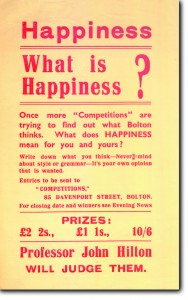I will be introducing the panel discussion at Mass Observation’s ESRC Festival of Social Science on the 8th November. In the build up to the event I’ve been thinking about happiness in the 1980s. When I’ve read through the Mass Observation Directive Retrospectives on 1986 and the decade as a whole in 1990, one of the things that jumps out is the sense of possible, or just avoided, disasters. 1986 saw the Challenger Space Ship Disaster, Chernobyl, and Hillsborough for example. Whilst the roundups of the decade in 1990 broadened these specific disasters out to more general concern about the environment, homelessness, AIDS and Famine. Not a lot to be happy about it seems. But in between these public concerns MOP shows moments of public and private happiness were being found in hopes for the future; a child’s first steps, or the marriage of children and birth of grandchildren were marked and celebrated alongside the marriage of Sarah Ferguson and Prince Andrew.
I’ve half inched the rest of this from the Mass Observation Archive. Reblogged from Jessica Scantlebury, MOA
In November we are hosting a series of events as part of the ESRC’s Festival of Social Science. The festival aims to highlights social science in society and support events that are engaging for everyone. The focus for our programme is, again, Mass Observation and happiness. The events are free and open to everyone. The details are:

What is Happiness? Investigating the everyday with Mass Observation
Monday 4th November (9.30am – 13.30pm) and repeated on Tuesday 5th November (9.30am – 13.30pm) at the Latest Music Bar, Brighton
Investigate the Everyday: Creative Writing and the Mass Observation Archive
Explore the relevance of social science research through the theme of happiness and discover how ordinary British peoples beliefs of the 1930s and 1990s can inspire your own creative writing.
In this practical workshop with Poet Evlynn Sharp and staff from the Mass Observation Archive you will be introduced to tools and values of research. You will also find ways of creating writing that can be helpful in everyday life and work, supporting self-reflection and powerful self-expression
The workshop is open to all.
Wednesday 6th November (2.30 – 4.30pm)
‘I love being in the garden’ Happy encounters in everyday life’ Public talk given by Mark Bhatti (University of Brighton) at the Latest Music Bar, Brighton
Thursday 7th November (2.30 – 4.30pm)
‘The Meanings of Happiness in Mass Observation’s Bolton’ Public talk given by Claire Langhamer (University of Sussex) at the Latest Music Bar, Brighton
Friday 8th November (Doors open at 7.00pm)
Panel discussion on “What is happiness?” chaired by Lucy Robinson (University of Sussex) with Annebella Pollen (University of Brighton), Ben Jones (UEA), and Emily Robinson (University of Sussex) at the Quadrant pub. Brighton
Advance booking for the ‘What is Happiness?’ is required. Please email: moa@sussex.ac.uk or call 1273 337515 to request a place.
The events will be documented on this blog by our blogger in residence and you can join in the discussion on Twitter by using the hashtag #HappyMOA